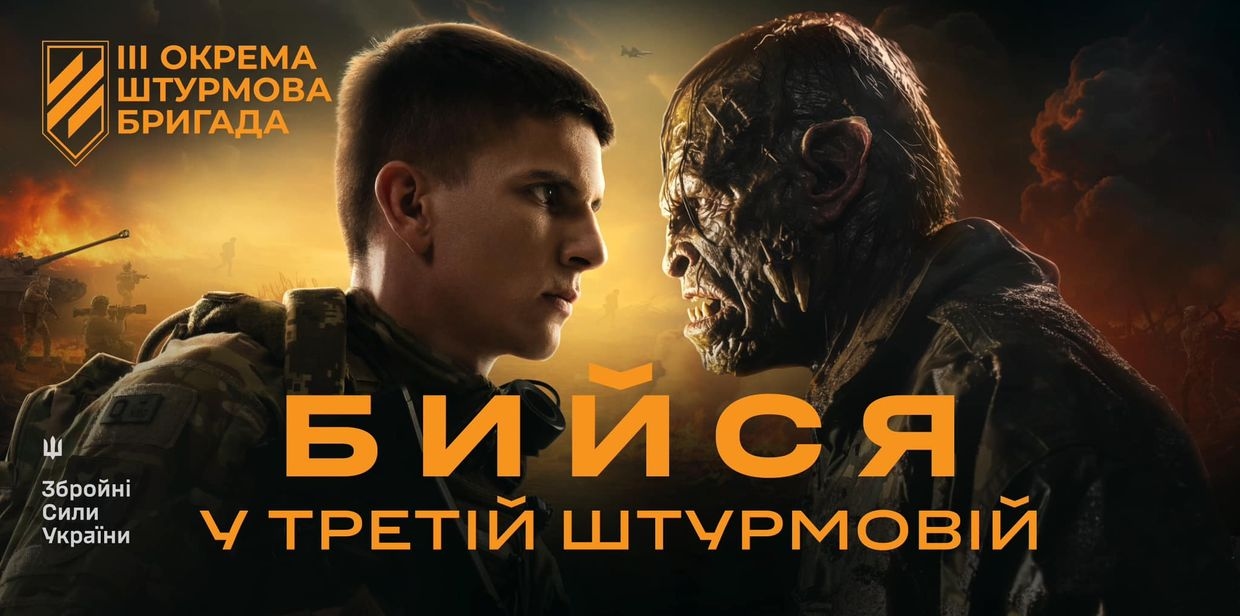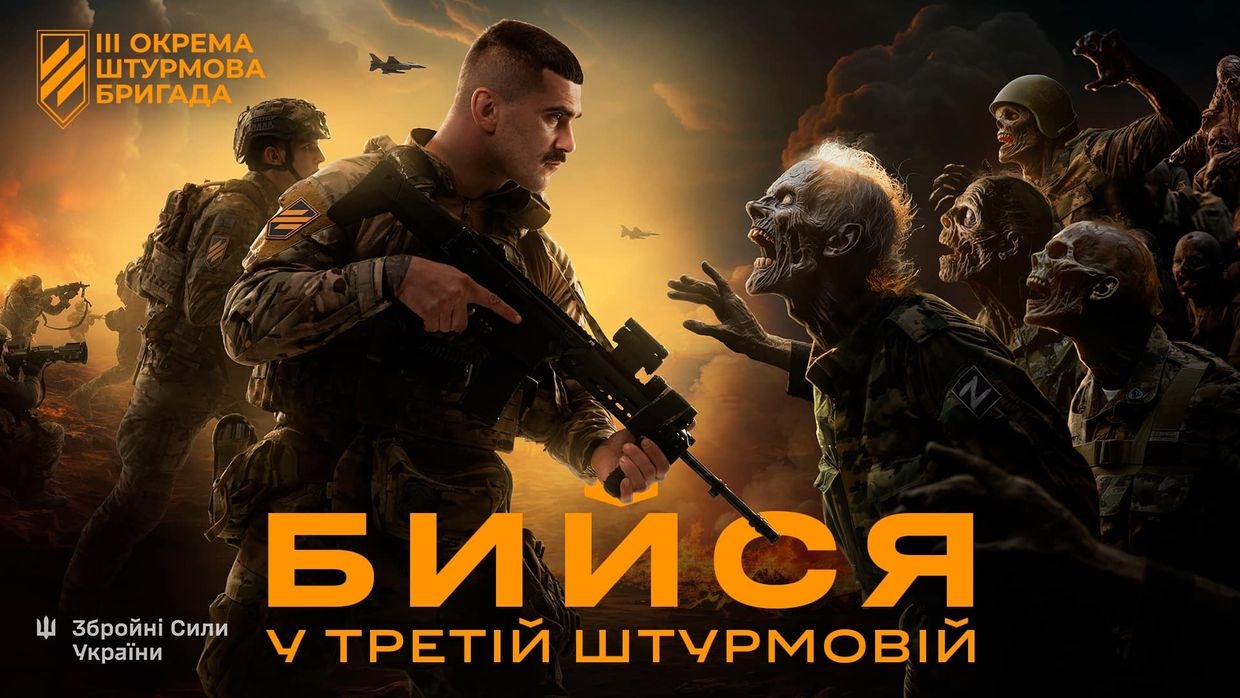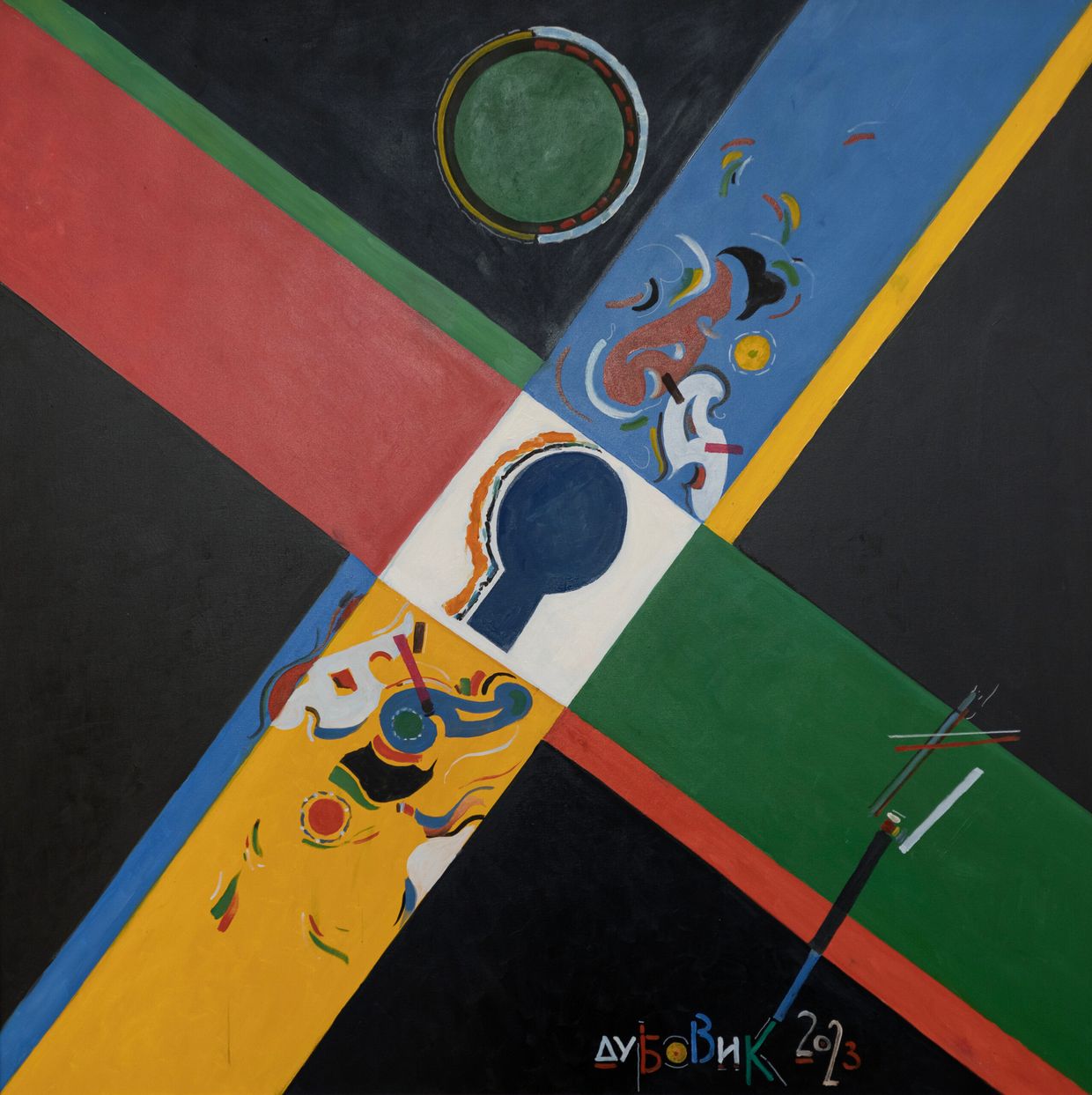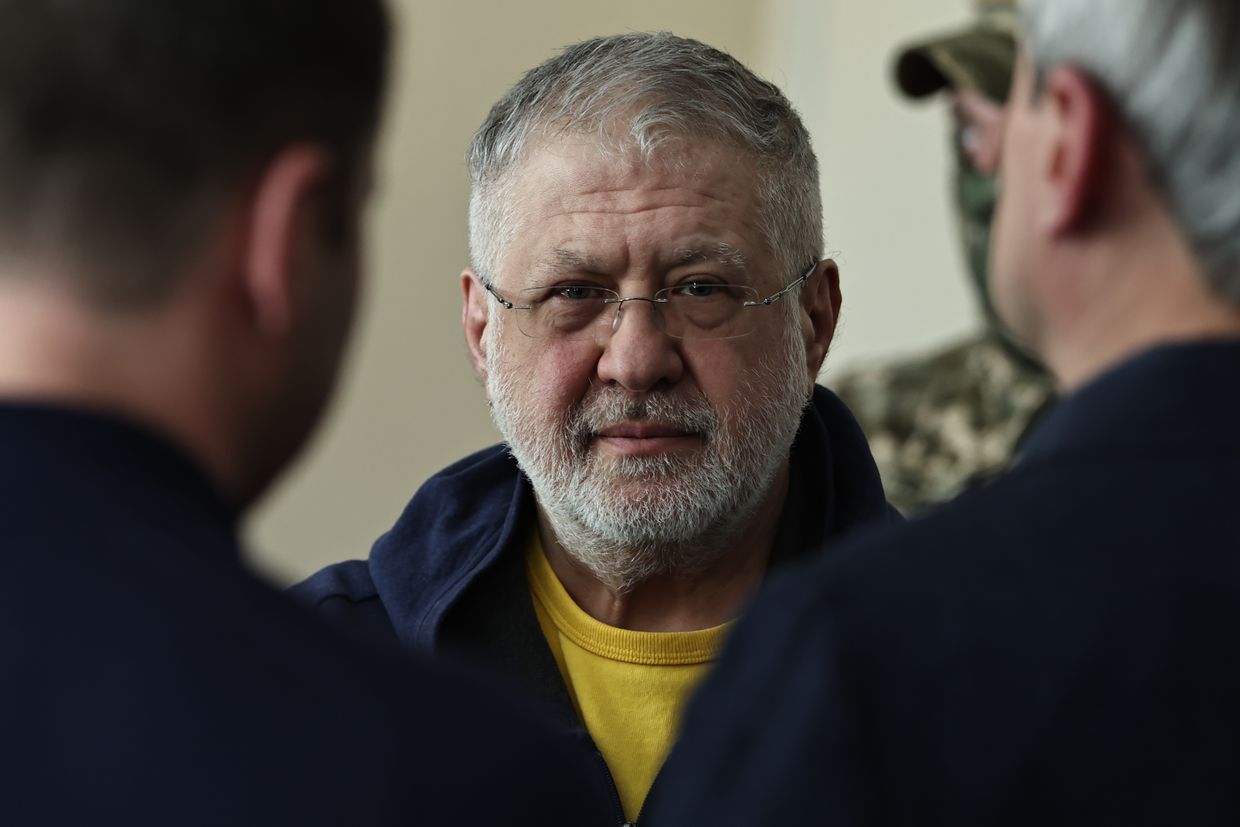The Counteroffensive: How Ukraine uses ‘The Lord of the Rings’ to frame its battle for survival
In casting Russia as Mordor and its soldiers as orcs, Ukrainians harness Tolkien’s allegory to sharpen the moral clarity of their fight against invasion.

A woman pushes a stroller past a Ukrainian Armed Forces recruitment poster in central Zaporizhzhia, Ukraine, on Dec. 20, 2023. The poster reads, "Fight in the Third Separate Assault Brigade." (Andriy Andriyenko/SOPA Images/LightRocket via Getty Images)

Mariana Lastovyria
Reporter at The Counteroffensive
Editor’s Note: This article was published by the twice-weekly newsletter “The Counteroffensive with Tim Mak” on Aug. 20, 2024, and has been re-published by the Kyiv Independent with permission. To subscribe to "The Counteroffensive," click here.

An isolated land in the East is shrouded in darkness. An evil lord, worshiped as a deity, rules over it. Those who serve him live only for war, bringing nothing but death and destruction.
Ukrainians may associate this description with Russia, but it’s actually an image of Mordor, a fictional country from J.R.R. Tolkien's trilogy, “The Lord of the Rings,” inhabited by barbarians who serve evil forces known as orcs.
The word "orc" has been widely used as a synonym for a Russian soldier since the full-scale war against Ukraine began. Such associations existed long before but became a national narrative in response to Russian atrocities and war crimes in 2022.
Information warfare is as crucial as combat on the battlefield, and military narratives play a significant role. Ukrainians were not the first to use literary allegories to boost morale and motivation during a war, but this is one of the first examples of using fantasy heroes to express the horrors of modern warfare – by civilians, the military, and government officials alike.
Ukrainians see their struggle as a battle between a free people and the embodiment of sheer darkness, reminiscent of Tolkien's tales. To them, Russians are brutal invaders wreaking havoc on another nation.
In the early days of the war, these vivid images helped unite Ukrainians and strengthen their resistance.
“People are very fond of allegories, and ‘The Lord of the Rings’ is a good source of material for that. The fantasy world is familiar – there you face war and fear. And, after reading this story, people want to have faith that there will be a happy ending,” Volodymyr Kushnarov, a true fan of ‘The Lord of the Rings,’ told The Counteroffensive.
Volodymyr’s fascination with Tolkien’s world began when his stepfather took him to a Kyiv cinema to see “The Lord of the Rings” as a child. Later, as a law student, he read the trilogy and returned to it repeatedly.
His deeper interest in Tolkien’s universe took root when he began working at a company that distributed Warner Brothers and Disney films in Ukraine. Now 30, Volodymyr collects rare editions of “The Lord of the Rings” and runs a TikTok blog that immerses Ukrainians in Tolkien’s Middle-earth.
“For me, ‘The Lord of the Rings’ and all of Tolkien's other works… are a pure form of escapism, lore-digging, and comfort-reading,” Volodymyr Kushnarov told The Counteroffensive. “Same with the movies, which most people are familiar with — in such tough times during the war you look for something familiar, known to you, with a happy ending.”
The events of “The Lord of the Rings” unfold on the central continent of Middle-earth, Tolkien's fictional world. To the east lies Mordor, a land encircled by mountains and inhabited by orcs, goblins, trolls, and other evil creatures. Sauron, the land's ruler and a master of dark magic, created the One Ring to conquer the free peoples of the West: Elves, Hobbits, and the neighboring human kingdoms.
Comparisons between Mordor and Russia date back to the Soviet era, when Tolkien’s works were seen as politically subversive. The USSR banned his books, interpreting orcs as an analogy for the Soviet people.
Orcs were creatures without high intelligence who valued quantity over quality in their armies. Isolated and antagonistic toward the rest of the world, they were likened to Soviet citizens. Some scholars, like Mike Fielden, have interpreted Sauron’s Ring of Power as an allegory for the nuclear weapons that the U.S. and USSR built during the Cold War.
Tolkien himself resisted such direct associations. In the foreword to the second edition of “The Lord of the Rings,” published in 1966, he clarified that the war for the ring was not a reference to World War II, nor was Mordor an allegory for the Soviet Union.
"Tolkien doesn't object to such comparisons – it's the reader's choice—but he opposed directly linking his work to real-world events. Each reader will find their own experiences in the story," Volodymyr explained.
Even after the Soviet Union collapsed, comparisons between Russia and Mordor persisted.
In the late 1990s, Russian writer Kirill Yesskov published “The Last Ringbearer,” which reimagined “The Lord of the Rings” as a Cold War allegory from the orcs’ perspective. Yesskov reshaped Tolkien’s world, turning orcs into a technologically advanced society battling a "decaying West." The novel won a literary award around the time Russian President Vladimir Putin rose to power.
In the early 2010s, Russian publicists Maxim Kalashnikov and Yuri Krupkov encouraged Russians to identify as orcs in their book “Orc Wrath.” Russian forums and the social network VKontakte were filled with memes jokingly comparing Russia and Moscow to Mordor.
Thus, Ukrainians weren’t the first to draw parallels between Russians and the dark forces of Tolkien’s world, but they embraced the comparison.
During Ukraine’s 2013-2014 EuroMaidan Revolution, sparked by then-Ukrainian President Viktor Yanukovych’s decision to pivot toward Russia, Euromaidan protests were seen as a stand against Mordor. The viral video “The Hobbit Uprising” further cemented this perception, blending footage of the protests with scenes from Peter Jackson’s “The Lord of the Rings” films.
Seizing on Ukraine’s vulnerability amid the revolution, Russia invaded Crimea and parts of Donetsk and Luhansk oblasts. Ukrainian soldiers and civilians on the front line began comparing Russian troops to orcs, or creatures who “had great hatred for all things free.”
In 2016, these allegories extended beyond internet jokes. Google Translate famously mistranslated "Russian Federation" as "Mordor" when translating from Ukrainian to Russian. Google attributed the error to an algorithm glitch or hack.

Russia’s pipelines, especially those controlled by Russian gas giant Gazprom, have also been linked to Sauron’s rings of power, as symbols of control and influence. The Eye of Sauron, representing omnipotence, has been compared to the gas flame.
The use of "orcs" for Russian soldiers and "Mordor" for Russia became widespread during the full-scale invasion in 2022. The day after the full-scale invasion began, one of the first Facebook posts by the Ukrainian Armed Forces said: “Orcs from Mordor suffer terrible losses!” Millions of Ukrainians have since used these terms on social media.
In March 2022, then-Ukrainian Defense Minister Oleksii Reznikov urged Ukrainians to “withstand the onslaught of Mordor.” Zelensky also used the term "orcs" to refer to Russians. For example, when Ukraine became a candidate to join the European Union, he remarked that Ukraine was no longer seen as a "border between orcs and elves."
Zelensky himself has been compared to a hobbit, a peaceful creature smaller than a dwarf, while Ukrainians are likened to elves fighting orcs in “The Lord of the Rings.” Goblins, the weakened descendants of orcs who fought alongside Mordor, are associated with Belarusians. It was from Belarusian territory that Russia launched its full-scale war against Kyiv in 2022.
Whether through humor or escapism, Tolkien’s fans in Ukraine have found solace in the fantasy world created by the series. “Mankind will never move beyond war, and that’s probably why people love “The Lord of the Rings.”
In the end, there's an irresistible force that saves everyone. All the characters, although they went through terrible things, survived,” said Volodymyr, the Tolkien fan.
Editor’s Note: The opinions expressed in the op-ed section are those of the authors and do not purport to reflect the views of the Kyiv Independent.













